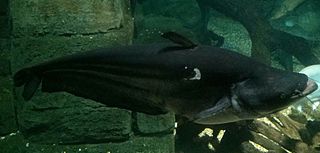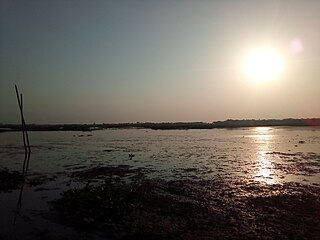
Tapah is a town and the capital of Batang Padang District, Perak, Malaysia.

Wallago is a genus of catfishes order Siluriformes of the family Siluridae, or sheatfish. They are found in rivers throughout southern and southeastern Asia. The only extant species of this genus is Wallago attu.

Wallago attu is a freshwater catfish of the family Siluridae, native to South and Southeast Asia. W. attu is found in large rivers and lakes in two geographically disconnected regions, with one population living over much of the Indian Subcontinent and the other in parts of Southeast Asia. The species can reach a maximum length of 2 m.

Siluridae is the nominate family of catfishes in the order Siluriformes. About 105 living species of silurids are placed in 12 or 14 genera.

The Adan River is a river in Washim District, Maharashtra, India and a principal tributary of the Painganga River.

Wallagonia micropogon is a species of catfish in the genus Wallagonia. This species was recently discovered and is found in the Mekong River drainage area between southern Vietnam and northern Laos as well as Chao Phraya River in Thailand. It is a freshwater fish.
Laides is a genus of catfish in the family Ailiidae native to Asia. These species are originates from Mekong and Chao Phraya River basins.

Ropar Wetland, also named Ropar Lake, is a man-made freshwater riverine and lacustrine wetland. The area has at least 9 mammal, 154 bird, 35 fish, 9 arthropod, 11 rotifer, 9 crustacean and 10 protozoan species, making it biologically diverse. This important ecological zone is located in the Shivalik foothills of the Lower Himalayas and was created in 1952 on the Sutlej River, in the Punjab state of India, by building a head regulator to store and divert water for beneficial uses of irrigation, drinking and industrial water supply. The endangered turtle Chitra indica and the threatened snake Python molurus, as per IUCN Red List, are reported to be resident in the wetland. Considering the wetland's diverse and rich biodiversity, Ramsar Convention has included Ropar Wetland as one of the Ramsar sites among the 42 sites listed under India, for "the conservation of global biological diversity and for sustaining human life through the ecological and hydrological functions they perform."
Sheatfish may refer to the following catfish:

Vikramshila Gangetic Dolphin Sanctuary is located in Bhagalpur District of Bihar, India. The sanctuary is a 60 kilometers stretch of the Ganges River from Sultanganj to Kahalgaon in Bhagalpur district. notified as Vikramshila Gangetic Dolphin Sanctuary in 1991, it is the protected area for the endangered Gangetic dolphins in Asia. Once found in abundance, only a few hundred remain, of which half are found here.
The Halali reservoir is a reservoir in Madhya Pradesh state of India, spanning Bhopal, Raisen, and Vidisha districts. It is built on the Halali River, and lies 40 km northwards from the state capital Bhopal.
Wallagonia maculatus is a species of catfish in the family Siluridae endemic to Malaysia, where it is known only from Sabah in northern Borneo. This species grows up to a length of 100 centimetres (39 in) SL.

Wallagonia leerii, also known as the Great Tapah, helicopter catfish, and formerly the striped wallago catfish is a species of catfish native to Southeast Asia. Its habitat ranges from the river drainages of Thailand through the Malayan peninsula to the islands of Sumatra and Borneo in Indonesia. It can grow up to 2 m in length and weigh up to 150 kg (330 lb). It has been used as food in Southeast Asia since ancient times. Overfishing for its prized meat has caused the population to significantly decrease. Furthermore, the breeding migration pattern of this fish is especially vulnerable to damming, which has also decreased the wild population significantly.

Wallagonia is a recently established genus of Silurid catfishes, containing 3 distinct species, all of whom are native to Southeast Asia:

Kapla Beel is a wetland and lake located towards the south of Baniyakuchi-Haladhibari under Sarthebari revenue circle in Barpeta district of Assam.

Phou Ningthou is a deity in Meitei mythology and religion (Sanamahism) of Ancient Kangleipak. He is the God and the divine male personification of the agriculture, crops, fertility, grains, harvesting, paddy, rice and wealth. He is the consort of Phouoibi (Phouleima), the goddess of crops and agricultural fertility.









